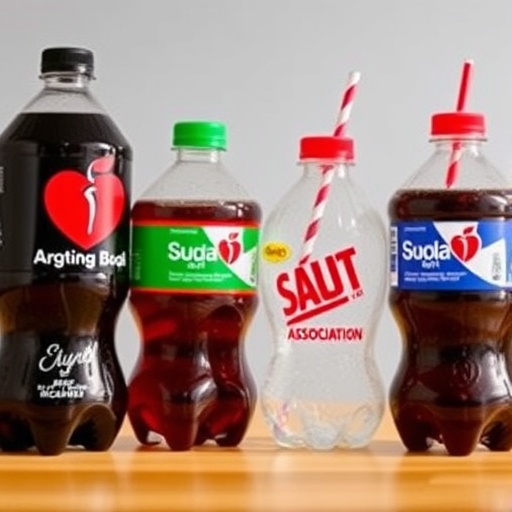In a bold and concerted effort to address one of the most pressing public health challenges in the United States, the American Heart Association (AHA) has publicly declared its support for the state of Arkansas’s application to the U.S. Department of Agriculture (USDA) to prohibit the purchase of sugary beverages through the Supplemental Nutrition Assistance Program (SNAP). This move is part of a wider commitment by the AHA to reduce excessive intake of sugary drinks, which are a significant contributor to the increasing burden of cardiovascular disease nationwide. Despite fierce opposition from the soda industry, this initiative underscores a growing movement within public health circles to implement regulatory measures aimed at curbing the consumption of added sugars.
Sugary beverages represent the largest source of added sugars in the American diet, accounting for a substantial proportion of daily caloric intake in many populations, particularly among low-income households who rely on SNAP benefits. The metabolic consequences of such consumption are well-documented, including an increased risk for obesity, type 2 diabetes, hypertension, and ultimately, cardiovascular disease—the leading cause of death in the United States. The AHA’s stance is grounded not only in epidemiological data but also in mounting clinical evidence linking sugary drink intake with adverse cardiometabolic outcomes.
The opposition from the soda industry to public health interventions aimed at reducing sugary drink consumption is both long-standing and vigorous. For decades, beverage companies have mobilized extensive lobbying efforts to prevent the implementation of policies such as soda taxes, marketing restrictions, and now, limits on what purchases are eligible under nutrition assistance programs. The industry’s strategy often involves disseminating misleading information, questioning scientific consensus, and framing regulatory actions as infringements on personal choice or unfair economic penalties.
Arkansas’s waiver request to the USDA represents a potentially transformative policy shift. If granted, SNAP recipients in Arkansas would no longer be permitted to use their benefits to purchase sugary drinks. This constitutes a pioneering example of leveraging federal nutrition assistance programs to promote healthier consumption patterns—a strategy that may be replicated in other states upon successful implementation and evaluation. Importantly, this intervention aligns with a public health paradigm that recognizes the environment in which food choices are made as a critical determinant of health outcomes.
Nancy Brown, CEO of the American Heart Association, emphasizes the public health imperative of this policy, stating that removing sugary beverages from SNAP aligns with efforts to significantly reduce cardiovascular disease risk at the population level. Her commentary reflects a broader recognition among health authorities that systemic approaches are necessary to combat dietary patterns entrenched by socioeconomic factors and aggressive marketing.
While the reduction of sugary drink consumption is a key goal, the AHA also underscores the importance of increasing access to and consumption of nutritious foods. This dual approach—restricting unhealthy options while promoting healthy alternatives—is critical for addressing the complex web of social determinants influencing diet quality. The challenge lies in crafting policies that are effective, equitable, and sustainable, without stigmatizing or penalizing vulnerable populations.
The experience of municipalities such as Philadelphia, Seattle, and various communities in California, including Santa Cruz, offers valuable lessons on the implementation of sugary beverage taxes. These local policies, supported by the AHA and other public health groups, have demonstrated modest but measurable declines in sugary drink sales and shifts toward healthier consumption. The enforcement of Arkansas’s SNAP waiver could complement these taxation strategies, forming a comprehensive policy environment that discourages sugary drink consumption while fostering healthier choices.
Critically, the soda industry continues to deploy what the AHA describes as a “desperate playbook,” employing misinformation and aggressive lobbying to undermine public health measures. This includes financial contributions to political campaigns, funding front groups to challenge scientific evidence, and promoting voluntary self-regulation schemes with little efficacy. Such tactics hinder progress and highlight the need for vigilant advocacy and transparent policymaking informed by scientific evidence.
The American Heart Association, with its century-long commitment to public health, research, and advocacy, serves as a pivotal actor in this landscape. Its endorsement of Arkansas’s SNAP waiver application signals a renewed vigor in tackling nutritional risk factors for cardiovascular disease through policy interventions. The AHA’s work integrates rigorous science, community engagement, and policy advocacy, positioning it as a credible voice in debates over the regulation of food and beverage environments.
Public health experts note that changing consumption patterns for sugary drinks requires multifaceted interventions spanning education, economic incentives, regulatory frameworks, and social norms. Removing sugary drinks from SNAP aligns with this multipronged approach and acknowledges the influence of the food environment on individual behavior. As such, the Arkansas proposal is not merely a punitive measure but a strategic effort to recalibrate incentives within federally supported nutrition programs.
In conclusion, the American Heart Association’s support for Arkansas’s USDA waiver request marks a critical juncture in public health policy. It exemplifies the intersection of evidence-based advocacy, regulatory innovation, and a commitment to health equity. As states and federal agencies consider the implications of such policies, the discourse surrounding sugary drink consumption continues to evolve, driven by science, public health priorities, and the persistent resistance of vested commercial interests.
Subject of Research: Strategies to reduce sugary beverage consumption through policy interventions in Supplemental Nutrition Assistance Program (SNAP).
Article Title: American Heart Association Supports Arkansas’s Proposal to Exclude Sugary Drinks from SNAP Benefits Amid Soda Industry Opposition.
News Publication Date: April 29, 2025
Web References:
American Heart Association’s Commitment to Reducing Consumption of Sugary Drinks: https://www.heart.org/en/get-involved/advocate/policy-research/our-policy-positions/our-commitment-to-reducing-consumption-of-sugary-drinks
Arkansas SNAP Waiver Comments PDF: https://newsroom.heart.org/_gallery/get_file/?file_id=68111c1ed8ee0a81a7d6c25a&file_ext=.pdf&page_id=
Keywords: Science advocacy, Health and medicine, Public health policy, Sugary drinks, SNAP, Cardiovascular disease, Nutrition assistance program, Soda industry opposition, Dietary intervention, Health equity
Tags: added sugars in American dietAmerican Heart Association initiativesArkansas sugary drink policycardiovascular disease prevention strategieshealth risks of sugary drinkslow-income nutrition challengesobesity and diabetes linkspublic health advocacy against sugary beveragespublic health sugary drink consumptionregulatory measures for health improvementSNAP prohibiting sugary beveragessoda industry opposition





